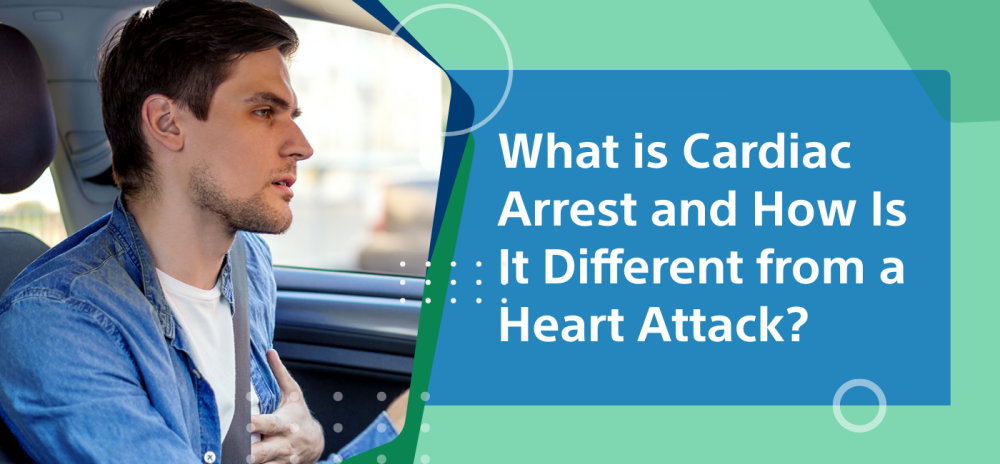Most people use the terms heart attack and cardiac arrest interchangeably. That misunderstanding, although common, may be dangerous. In the event of collapsing or chest pain, every passing moment matters a lot. Being mistaken about a person’s condition might prevent quick treatment and, on some occasions, could determine whether they survive or not.
Understanding the difference between a heart attack vs cardiac arrest isn't just medical trivia. The skills you learn can protect you or assist you in thinking fast during a dangerous situation. This blog looks into each condition, the symptoms your body gives, and how to take action when those symptoms appear.
What Is a Cardiac Arrest? A Silent Electrical Crisis
Cardiac arrest occurs when the heart’s electrical system malfunctions, causing the heart to stop pumping blood effectively—or at all. When there’s no pulse, oxygen is unable to supply the brain or the crucial organs. A person having a heart attack usually collapses after a few seconds and becomes unconscious.
Some causes of cardiac arrest include:
Sudden changes in heart rhythm (especially among people who have heart problems)
Besides diabetes, heart failure should not be ignored.
- Trauma
- Electrocution
- Drowning
Cardiac arrest is a medical emergency in the purest sense of the term.
What is a Heart Attack? A Plumbing Problem with Loud Alarms
Now, let’s imagine a pipe that is blocked with material. That’s the metaphor for a heart attack, also called myocardial infarction. It takes place when one or more arteries feeding the heart with oxygen fail to work properly.
The usual reason for a blockage is plaque, which consists of fat, cholesterol, and various materials. If a plaque breaks open, a blood clot is created and this obstructs the flow of blood. The result? Some of the heart muscle starts dying because it does not get enough oxygen.
A heart attack can be mild or serious, depending on the severity of the blockage and how quickly treatment is received.
Unlike cardiac arrest, a heart attack usually comes with warning signs and progressive symptoms, giving you time—albeit not much—to react.
It’s vital to remember that a heart attack can lead to cardiac arrest, but not every heart attack ends that way. These two medical problems are different even though they share some connections.
Heart Attack vs Cardiac Arrest: Understanding the Core Differences
So let’s break down the differences in a way that’s easy to remember:
|
Feature |
Heart Attack |
Cardiac Arrest |
|---|---|---|
|
Cause |
Blocked artery |
Electrical malfunction |
|
Onset |
Gradual (minutes to hours) |
Sudden (in seconds) |
|
Consciousness |
Usually alert |
Usually unconscious |
|
Pulse |
Often present |
Usually absent |
|
Treatment |
Medications, stents |
CPR, AED (shock) |
|
Urgency |
High |
Immediate |
Who’s at Risk? Know Your Personal Red Flags
When you know what risks you have, you can act ahead of time instead of waiting.
Heart Attack Risk Factors:
- High blood pressure is one of the main reasons for heart disease.
- Causes of having high cholesterol
- Smoking
- Diabetes
- Obesity
- Inactive way of life
- history of heart health in the family
Cardiac Arrest Risk Factors:
- Previous heart attack or heart failure
- Problems with the heart’s rhythm, also called arrhythmias
- Problems that children are born with
- Taking drugs not recommended by a doctor
- Problems with the levels of electrolytes
- Commotio cordis (the impact disease affecting athletes)
Even healthy and youthful persons are still affected by heart conditions. Several cases of sudden cardiac arrest in athletes have made headlines, highlighting how some causes are hidden and genetic.
Final Takeaway: When in Doubt, Act Fast – Every Second Counts
If you remember nothing else, remember this: cardiac arrest is a race against time, and heart attacks are loud warnings that something worse may be coming. Recognising the signs of a heart attack and the signs of a cardiac arrest can empower you to act decisively, either for yourself or someone else.
Taking the time to learn CPR is important. Be aware of the numbers in your business. Taking chest problems or being very tired lightly is not a good idea. Make sure to pay attention to what your body is trying to say, before it gives you bigger signs.













